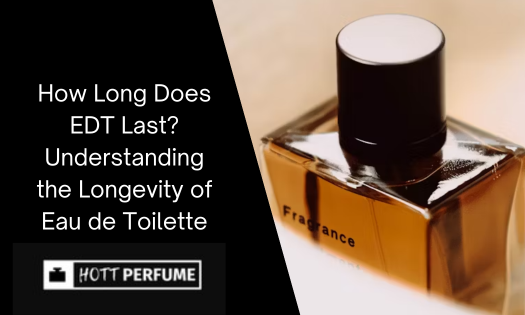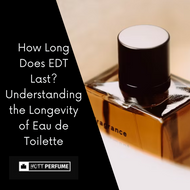How Long Does EDT Last? Understanding the Longevity
Posted by Tina Wilson on Jul 13th 2025

Introduction to Fragrance Longevity
Eau de toilette (EDT) typically contains a lower concentration of fragrance oils compared to eau de parfum (EDP), which directly affects how long it lasts on the skin. Generally, EDTs last around 4 to 6 hours, making them a popular choice for those who prefer a lighter, more subtle scent throughout the day.
Understanding fragrance longevity is key to getting the most out of your favorite perfumes, whether they are part of a luxury fragrance collection or everyday scents. The duration a fragrance remains noticeable on your skin depends on several factors, including your skin type, where you apply the fragrance, and environmental conditions like temperature and humidity.
Fragrance concentration plays a significant role in longevity; higher concentrations, such as those found in eau de parfum, tend to last longer. Additionally, proper storage—such as keeping your perfumes in a cool, dark place—can help preserve their quality and extend the shelf life of your fragrance collection.
Concentration of Perfume Oils
Eau de toilette (EDT) typically contains between 5-15% fragrance oils, making it lighter and more subtle compared to eau de parfum (EDP), which has a higher concentration of 15-20% fragrance oils. This difference in concentration directly affects both the strength and duration of the scent, with higher concentrations offering richer compositions and longer-lasting wear.
Different perfume types, such as eau de cologne, also vary in their fragrance oil concentrations, which influences their overall longevity and scent profile. The concentration of perfume oils not only determines how long a fragrance lasts but also shapes its character—from fresh, vibrant opening notes to deeper, more enticing base notes.
Additionally, natural oils like essential oils play a key role in defining a fragrance’s uniqueness and longevity, contributing to the complexity and lasting power of the scent.
Types of Perfumes
Perfumes come in various types, such as eau de parfum, eau de toilette, and eau de cologne, each differing in fragrance concentration and longevity. Generally, higher concentrations mean longer-lasting scents, with eau de parfum lasting longer than eau de toilette, and eau de cologne being the lightest and shortest-lived.
Fragrance families also influence longevity. For example, oriental and woody perfumes tend to last longer than lighter colognes because they contain richer, more concentrated ingredients. Choosing fragrances with heavier notes like amber or leather can also result in longer-lasting wear, as these balsamic notes resist oxidation and degradation better over time.
Artisanal perfumes, such as those from Creed, often feature complex compositions and higher fragrance concentrations, offering a more enduring scent experience. It’s important to note that perfume expiry dates can vary based on the type of perfume and how it’s stored, with proper storage helping to maintain fragrance quality over time.
Skin and Perfume Interaction
|
Factor |
Impact on Perfume Longevity and Scent |
|---|---|
|
Skin Type |
Oily skin helps perfume last longer; sensitive or dry skin may reduce longevity. |
|
Application Points |
Applying to pulse points (wrists, neck) without rubbing helps scent diffuse and last longer. |
|
Body Oil |
Natural oils on skin can enhance fragrance retention and projection. |
|
Skin Temperature |
Warmer skin increases fragrance evaporation, potentially shortening scent duration. |
|
Fragrance Selection |
Connoisseurs consider skin type and interaction to choose a signature scent that performs well. |
This table highlights how various skin-related factors influence the way perfume smells and lasts, helping you optimize your fragrance experience.
Environmental Factors
-
Environmental factors, such as temperature and humidity, impact fragrance longevity, with high temperatures and humidity reducing how long perfume lasts.
-
Airflow and wind can also speed up perfume evaporation, shortening fragrance longevity.
-
Storage conditions, like keeping perfumes in a cool, dry place, can help extend the shelf life of your fragrance collection. Minimizing your fragrance's exposure to light, heat, and oxygen is essential to preserve its longevity and prevent premature degradation.
-
Perfume expiration can be influenced by environmental factors, such as exposure to sunlight and heat. Using your fragrance faster as the bottle nears empty helps you enjoy the scent at its freshest and reduces the risk of oxidation. The importance of perfume's storage conditions cannot be overstated, as proper storage significantly prolongs the shelf life and quality of your fragrance.
Applying Perfume Correctly
-
Applying perfume to the right areas, such as pulse points, can enhance fragrance longevity and prevent fragrance’s exposure to air.
-
Using the right amount of perfume, such as 2-4 sprays, can help achieve the desired scent strength and duration.
-
Layering fragrances, such as combining eau de parfum and body oil, can create a longer-lasting scent and unique fragrance experience. Artisan perfumers advise to layer fragrances with complementary notes to enhance longevity and create a unique scent profile.
-
Applying perfume at the right time, such as after bathing, can help fragrance last longer on the skin.
Understanding Enticing Notes
-
Enticing notes, such as fresh patchouli and smoky sandalwood, can add depth and complexity to a fragrance, making it more appealing and longer-lasting. An intricately layered composition and delicate composition of fragrance notes work together to create the enticing notes left behind as the scent evolves.
-
Fragrance notes, including top notes and base notes, contribute to a perfume’s character and longevity.
-
Perfume oils, such as those used in artisanal perfumes, can feature unique and enticing notes that set them apart from other fragrances.
-
The scent’s composition, including the balance of fragrance notes, affects its longevity and overall character.
Building a Fragrance Collection
-
Building a fragrance collection, including luxury fragrance collection and exquisite scent, requires consideration of fragrance concentration, longevity, and personal preferences.
-
Many fragrance connoisseurs seek out unique and complex fragrances with higher fragrance concentrations for a longer-lasting scent.
-
Perfume expiration and fragrance expiration should be considered when building a fragrance collection, with proper storage conditions helping to extend shelf life. Using a fragrance box is helpful for organizing and tracking unopened perfumes and most perfumes expiry dates. Keep in mind that perfumes expiry dates refer to the period after opening, as unopened perfumes can last for many years if stored properly.
-
A well-curated fragrance collection can provide a range of scent options for different occasions and preferences.
Perfume Expiration
Perfume expiration is an important consideration for anyone who wants to enjoy their favorite fragrances at their best. Generally, an unopened perfume—whether it’s an eau de toilette or an eau de parfum—can maintain its quality for about 3 to 5 years if stored correctly. Once opened, the shelf life typically shortens to around 1 to 3 years, as exposure to air and light can accelerate the breakdown of fragrance oils and natural oils present in the formula. The higher concentration of fragrance oils in eau de parfums often means they last a bit longer than eau de toilettes, which have a lighter composition.
To preserve your fragrances, keeping fragrances in a cool, dark place is essential. This helps slow down the oxidation process and protects the delicate balance of scent notes. Always check for any changes in color, scent, or consistency, as these can indicate that a perfume is past its prime. By understanding perfume expiration and practicing proper storage, you can ensure your favorite fragrances remain fresh and enjoyable for as long as possible.
Expired Perfume Handling
-
Expired perfume can still be used, but its quality and longevity may be compromised.
-
As most fragrances age, their color may shift from a typical pale yellow hue to a darker juice or even a much darker juice. While this can indicate oxidation, some perfumes—especially those with natural oils—may still be perfectly wearable despite these changes.
-
Perfume expiration dates can vary depending on the type of perfume and its storage conditions.
-
Handling expired perfume requires caution, as it may cause skin irritation or allergic reactions in some individuals.
-
Disposing of expired perfume properly, such as through recycling or responsible waste management, is essential for environmental sustainability.
Factors Affecting How Long Does Perfume Last
-
Several factors affect how long perfume lasts, including fragrance concentration, skin type, and environmental factors. So scents with lighter top notes, such as zesty citrus, sweet florals, crisp green apple, or bergamot leading, are more susceptible to oxidation, and improper storage exposes the scent, reducing longevity.
-
Fragrance type, such as eau de parfum or eau de toilette, impacts longevity due to differences in fragrance oil concentration.
-
Perfume oils, such as natural oils and essential oils, contribute to a fragrance’s character and longevity.
-
Storage conditions, such as temperature and humidity, can influence perfume expiration and fragrance longevity.
The Impact of Perfume Oils on Longevity
-
Perfume oils, such as fragrance oils and essential oils, play a crucial role in determining a fragrance’s longevity.
-
Understanding the scent's composition and maintaining your signature scent correctly, as advised by creed's master perfumers, helps preserve an exquisite olfactory experience.
-
Higher fragrance concentrations, such as those found in eau de parfum, result in longer-lasting scents due to the increased amount of perfume oils.
-
Natural oils present in fragrances, such as essential oils, can contribute to their unique scent and longevity.
-
The quality and type of perfume oils used in a fragrance can impact its overall character and longevity.
Creating a Lasting Scent
Achieving a lasting scent is both an art and a science, and it starts with choosing the right fragrance concentration. Eau de parfums, with their higher fragrance oil content, naturally offer a longer-lasting scent compared to lighter eau de toilettes. To maximize how long your perfume lasts, many fragrance connoisseurs recommend applying perfume to pulse points like the wrists, neck, and behind the ears, where body heat helps diffuse the fragrance throughout the day.
Layering is another effective technique—using a body oil or lotion with a similar fragrance profile before spritzing your perfume can help lock in the scent and enhance its longevity. Applying a small amount of fragrance oil directly to the skin can also intensify and extend the wear of your signature scent. Remember, your skin type plays a role too; those with oilier skin may find that fragrances last longer, while drier skin might require a bit more layering. By understanding these factors and applying perfume thoughtfully, you can enjoy a fragrance that lingers beautifully from morning to night.
Conclusion on Perfume Longevity
In summary, the longevity of your perfume depends on a blend of factors, including fragrance concentration, skin type, storage habits, and how you apply your scent. Whether you gravitate toward the subtle freshness of an eau de toilette or the rich depth of an eau de parfum, taking care to store your fragrances properly and apply them correctly will help you get the most out of your luxury fragrance collection. Investing in high-quality perfumes, such as those from creed fragrance, ensures you’re experiencing an exquisite scent crafted by master perfumers for lasting enjoyment.
By paying attention to your skin type, choosing the right fragrance concentration, and following best practices for storage and application, you can curate a fragrance collection that stands the test of time. With a little knowledge and care, you’ll not only extend the life of your favorite perfumes but also elevate your daily scent experience—becoming a true fragrance connoisseur in the process.


